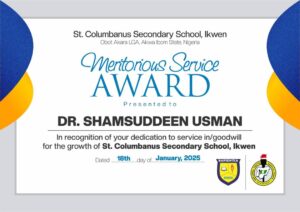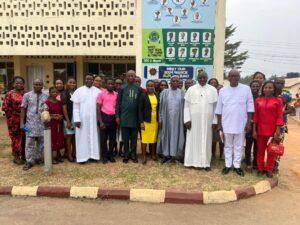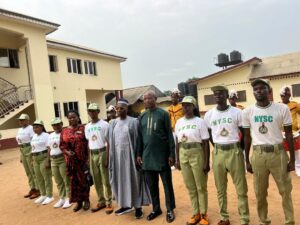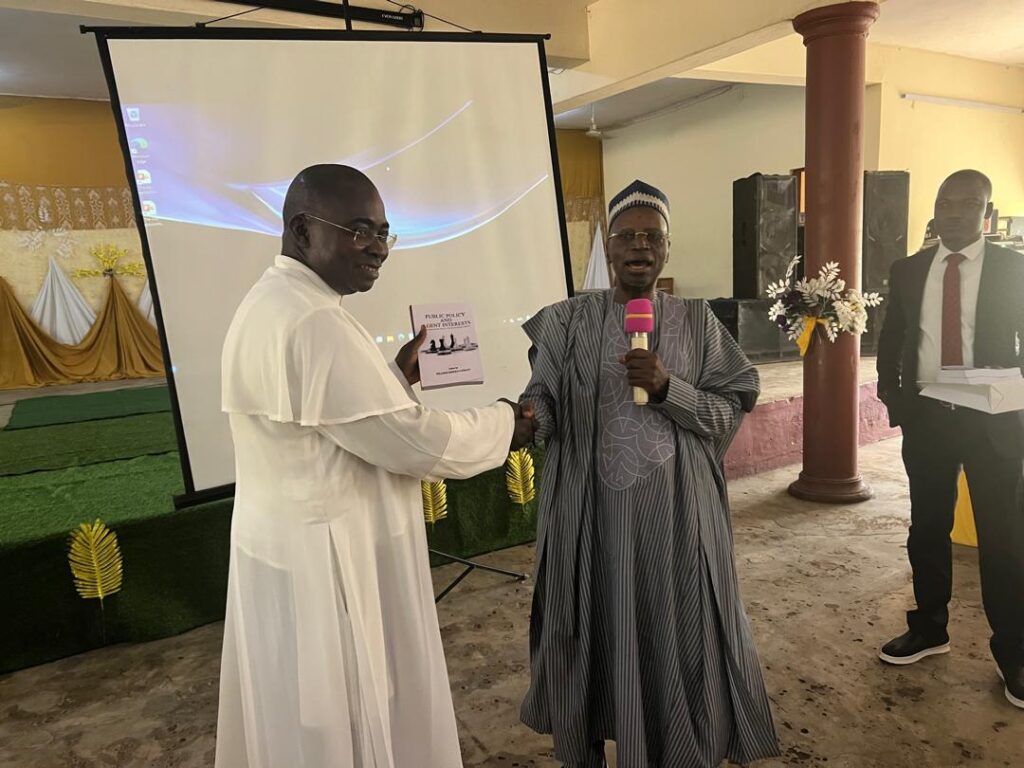
By Etim Etim

There are many stories of old students going back to their alma mater to build classrooms and donate books to the school’s library. I am also familiar with cases of NYSC members using their meager allowances to fund construction of toilet facilities in the schools they’re teaching. But the case of a former NYSC member going back to his place of primary assignment 51 years after he passed out to make contributions is a rare act of benevolence. This is the story of a 24-year-old ABU graduate from Kano State who participated in the first set of the NYSC scheme in 1973; was posted to what was then known as South Eastern State (renamed Cross River in 1976 from which Akwa Ibom was carved out in 1987) and sent to a catholic school, St. Columbanus Secondary School in Ikwen, a very rural community in what is now Obot Akara LGA in Akwa Ibom State, for his primary assignment. He taught English; maths and French.
In the many years after he left the village, the young man went on to acquire postgraduate degrees in Economics at the London School of Economics and Political Science, worked in the banking industry and later became Nigeria’s Minister of Finance, and later Minister of National Planning. In all these years, Dr. Shamsuddeen Usman, former executive director of UBA and Union Bank; former chief executive of NAL Merchant Bank (now Sterling Bank) and former deputy governor of CBN, never forgot his one year of national service at the rustic community and the lessons he learned.
Last Saturday, Usman, 75, elder statesman and distinguished technocrat, retraced his steps back to the school where he gave a talk to the students and teachers; donated money; instituted a prize for the best final year student in economics and left a few lessons in humility and kindness. I have known him for 35 years, and so, when he invited me to join him, I quickly sensed that the trip would be full of symbols, symbolism and unforgettable experiences. We arrived the school at 10.30am, half an hour earlier than scheduled, but the versatile principal, Rev. Father (Dr) Emem Umoren and his team were ready for us. It was my first time there, although I have driven past the school a few years back on my way to Owerri. The student band was playing while a guard of honour mounted by serving NYSC members was set for the guest’s inspection.

With the welcome formalities done, the principal received and briefed us at his residence. St. Columbanus was established in 1959 by the Catholic missionaries from Ireland, first as a boys’ school, but later turned into a coed. It was taken over by the State government in 1970/1971, and given back to the church in 2008/2009 session. With nearly 600 students; only one-third from Akwa Ibom (the rest from Abia, Cross River and other states), the school has a maintained impressive academic performance. Since last February, it’s been generating its own electricity mostly from solar, supplemented with diesel generators. Each student pays only N210, 000 for boarding and tuition per term, a meager sum compared to private schools. ‘’The campus is so beautiful; it would pass for a small community college or university’’, I said, eliciting smiles from the principal, who had by now been joined by the Dean of Students Affairs, Rev. Father Dominic. Dr. Usman listened, nodding intermittently as the principal spoke on the history; facilities; academic performance; faculty of the school and its needs.
‘’We farm and produce a lot of our food, but we also need donations from individuals and organizations’’, the principal said. Five years ago, NCC donated a computer lab, but Akwa Ibom State government is yet to offer assistance, although senior government officials, including commissioners, have their children there. ‘’We don’t need government’s money, but they can donate facilities like hostels’’, the principal concluded just as we moved to the assembly hall where the students, teachers and NYSC members were already seated for the rest of the program. In the audience also were Bartholomew Ogbonna, representing the NYSC State Coordinator; Principal of Methodist Boys School, Nto Ndang, and the President of the alumnus association.
In the assembly hall, Dr. Usman gave a keynote address on the theme: ‘’What’s your measure of success?’’, emphasizing the seven ingredient of success and importance of honesty and trust; touching on his personal stories as a corps member and the early lessons he learned. He described the school as ‘’the best of the best’’, and applauded the management and staff for upholding high standards and nurturing well-rounded students over the years. Usman recalled that he had so well integrated himself into the community that the principal of the neighbouring Methodist Boys High School, Nto Ndang, had invited him to teach Hausa to his students out of admiration for both the NYSC scheme and his personal conduct.
When Usman arrived Ikwen in 1973, there was no shop in the school and the village. The school had only two graduate teachers, with him making the third. With permission from the principal, he set up the first cooperative shop which turned out to be very profitable. He commuted on his motor bike between the village and Ikot Ekpene – a 20 km distance – to buy provisions for the shop. On one of those commutes, he had an accident, suffered severe concussion and was unconscious for eight days in a hospital. The accident, he said, was a turning point in his young life as it was a major reason he went for his postgraduate studies because ‘’I wanted to test that my mental capabilities were no badly affected’’, he said, noting that something good could come out of a misfortune.

He recalled how a stranger he met in the village had queried how a Hausa man like him (He’s actually Fulani) could be a university graduate – a hackneyed stereotype in those days. Concluding his lecture, Dr. Usman promised to ‘connect’ the school to greater opportunities which he may have in future and announced a cash donation to the school which the principal promptly pledged to use in establishing a basketball facility to be named after the donor. There were responses from NYSC members; teachers and the senior prefect, all commending Dr. Usman for his uncommon gesture.
Now, what are the takeaways from Usman’s return to Ikwen? The visit reflects a genuine act of generosity without expectation of a reward. Dr Usman is not a government contractor and he has no family ties to Akwa Ibom state or the school beyond the fact that he did his NYSC program there over half a century ago. He simply followed his natural instincts for philanthropy and a knack for building friendships. The visit also demonstrated that there are Nigerians who do not allow religion; tribe and ethnicity to influence their actions. Third, his visit also taught a lesson in humility and simplicity. Very few people of his ilk would go back to where they did NYSC to give back to the society on their own, without political or ethnic considerations. Four, a genuine act of bigheartedness does not require social media showmanship.




GIPHY App Key not set. Please check settings